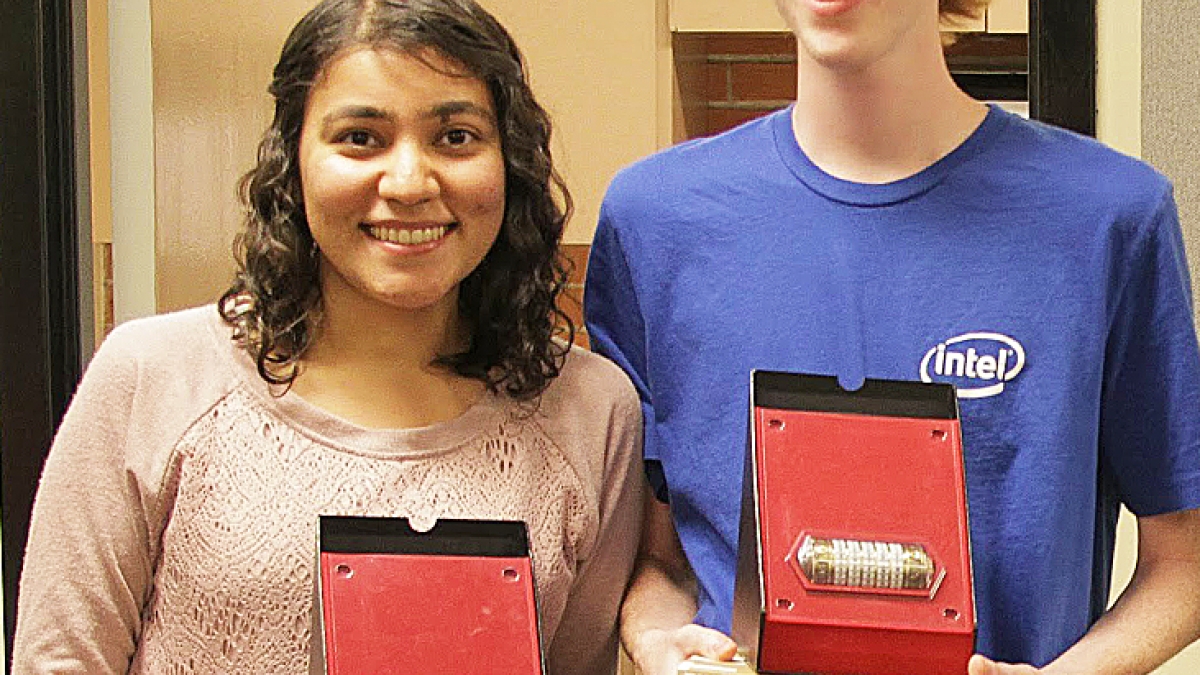ASU seniors Zahra Hussaini and Patrick Murray defended their CryptoRally championship title, Nov. 2, on the Tempe campus, leaving the other teams far behind. Both are dual majors in math and physics, and credited their pre-competition preparation for giving them the edge in the annual code-breaking competition, hosted by the School of Mathematical and Statistical Sciences.
“Both Thursday and Friday evenings we spent reviewing the different kinds of ciphers that might be included and programming our calculators,” said Hussaini. Calculators are allowed, but no computers or smartphones, according to the CryptoRally rules.
Murray conceded that this year’s ciphers were a bit more challenging than last year’s. “We were glad we had our (calculator) programs ready, which helped with some of them. But there were a couple that we really had to spend some time on.” Murray and Hussaini finished the rally in just over two hours, well ahead of the next closest team.
Twenty-nine teams competed in the third annual competition. Coming in second place was the team of junior Gene Silva and senior Louis Wilson, who also placed last year. Finishing third were seniors Grant Marshall and Daniel Howe.
For the first time, this year’s competition included a "junior" division for middle school students who had been studying cryptography and practicing their deciphering skills. Eight middle school teams competed. Susanna Fishel, associate professor of mathematics, led a before-school club at a local middle school to help get the kids interested in cryptography.
Fishel was thrilled with how the young pre-teens performed at their first rally. “We wanted to show middle school students some mathematics they wouldn't ordinarily see until some time in college: modular arithmetic and inverse functions, for example. They did beautifully on the math part. All the kids had a great time.”
The CryptoRally is designed by Nancy Childress, associate director, who teaches cryptography. The School of Mathematical and Statistical Sciences has hosted the CryptoRally event for the past three years.
Cryptography, the science of making and breaking codes and ciphers, is an important field of study today, according to Childress. “Cryptography helps to protect personal, financial, proprietary and defense-related information. Among many other things, it is used in internet commerce and in communication devices, such as mobile phones and cable boxes. Modern cryptology relies on ideas from number theory, abstract algebra and discrete mathematics. A good background in these subjects is essential for anyone who wants to understand how modern cryptosystems work.”
After the rally competition, an enthusiastic audience of students and faculty attended the featured lecture delivered by Lawrence Washington of the University of Maryland. In Cannonballs, Donuts, and Secrets: An Introduction to Elliptic Curve Cryptography, Washington described how elliptic curves have become very important in cryptography.
The CryptoRally event included a student poster session, which was judged by featured lecturer Lawrence Washington and Andrew Bremner, professor of mathematics. The author of the winning poster was Miles Laff, a dual mathematics and computer science major, who studied Diffie-Hellman Key Exchange.
The event was again sponsored by Apriva, a secure mobile communications company based in Scottsdale, Ariz. Chris Spinella, CEO of Apriva, is an ASU alumnus and says he completely supports these types of events. “As a local businessman, I rely on the intellectual capital ASU provides for attracting talented employees. Twenty-seven percent of my employees have attended ASU and we do a lot of work with the U.S. intelligence community in the area of sending classified data which, of course, involves cryptography. The CryptoRally is a great way for our company to support the work ASU is conducting in cryptography and help ensure that the next generation of ASU-trained mathematicians and scientists are well prepared to successfully enter this rapidly growing field.”
More Science and technology

Study reveals genetic insight into desert survival
The deserts of the American Southwest are home to the Mojave and Sonoran desert tortoises, two seemingly similar yet genetically…

Study reveals lasting effects of common weed killer on brain health
Environmental exposure to toxins in the air, water or certain chemicals can increase the risk of ill health effects, including to…

ASU grad to use science to get an edge on crime
Editor’s note: This story is part of a series of profiles of notable fall 2024 graduates.As a child growing up in Pinetop,…
